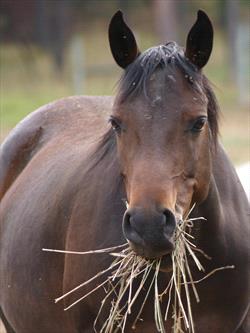Bob Judd, DVM, DABVP (Equine Medicine), DABVP (Canine and Feline Practice)
Fat bay horse eating hay

Feeding alfalfa hay to horses has been shown to decrease the formation of stomach or gastric ulcers. Deciding what is the best form of alfalfa to feed is more complicated.
Clair Thunes, PhD, author for the publication The Horse, writes that alfalfa is high in calcium. High calcium decreases the amount of acid in the stomach due to its buffering ability, which reduces stomach acidity.
In a study done at Texas A&M University, 12 horses were divided into two groups. For 28 days, Group One was fed Bermuda grass hay along with a concentrated feed, and Group Two was fed alfalfa hay and a concentrated feed.
The horses were switched after a 21-day washout period. Before the study, horses had their stomachs scoped to figure out if any stomach ulcers were present and were scoped again after the 28-day treatment period.
The researchers found ulcer severity scores were much lower when horses were fed alfalfa than Bermuda grass.
The study showed that feeding alfalfa prevented ulcer formation in 11 of 12 horses, while only three of the 12 horses eating Bermuda grass did not have ulcers.
The researchers believe this is due to high calcium and increased protein in alfalfa. Long-stem hay requires more chewing, which increases saliva and increases the buffering effect in your horse's stomach. Also, long-stem hay supplies better coverage in the stomach to protect sensitive tissue from gastric acid.
The calcium in alfalfa pellets might buffer more quickly than hay due to the smaller particle size, but these smaller particles may move out of the stomach quicker than larger particles.
If you are riding your horse on an empty stomach, alfalfa pellets will likely prevent more ulcers, although you will not get the covering, or mat, in the stomach like with hay. If you arrive in time to feed your horse hay before riding, hay is likely the best choice to prevent ulceration.